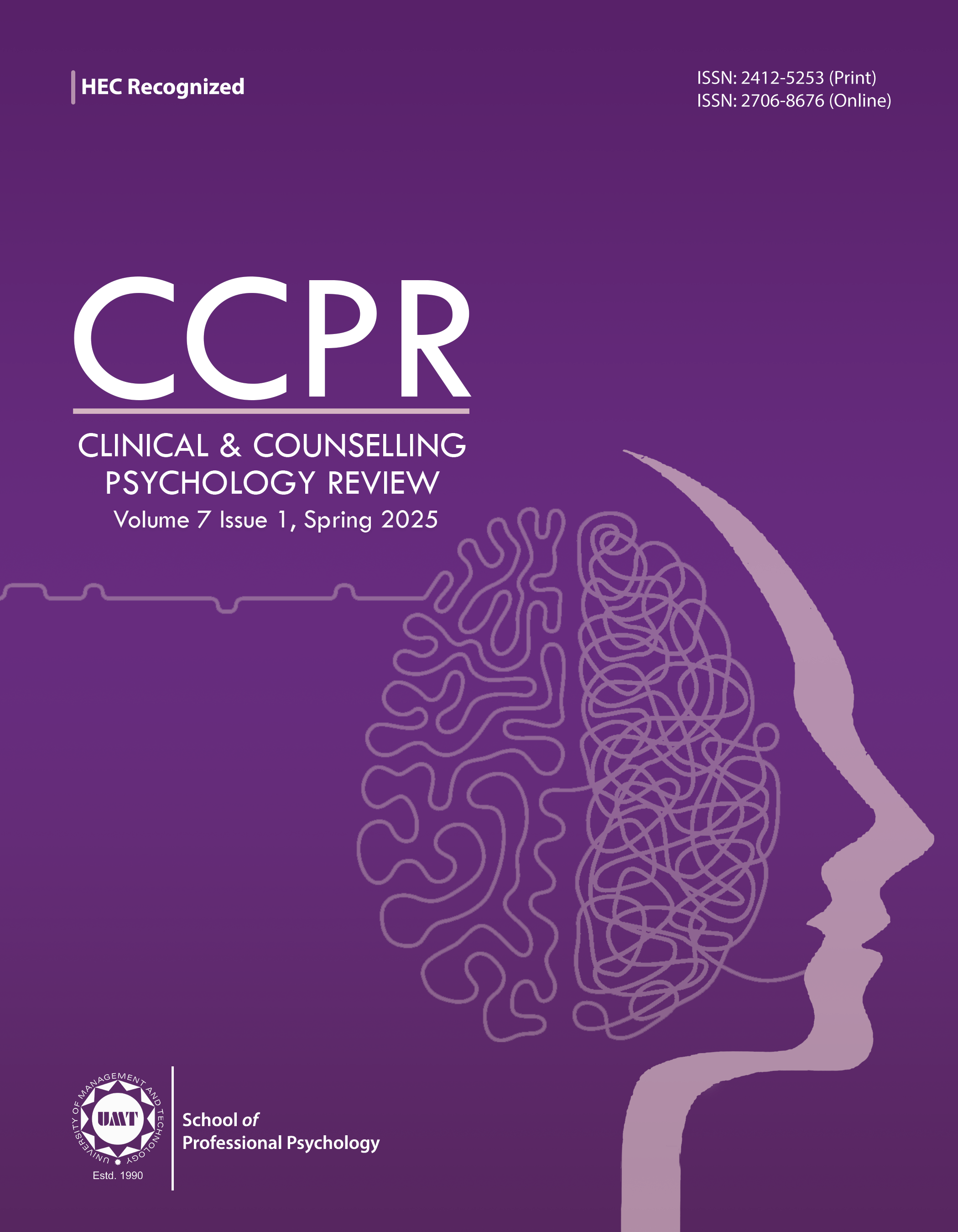Personality Traits and Fear of Missing Out (FOMO) as Predictors of Self-Esteem in TikTok Users
Abstract
 Abstract Views: 0
Abstract Views: 0
The current study examined the correlations among personality traits, fear of missing out (FOMO), and self-esteem in TikTok users based on a correlational research design. Purposive sampling method was used to select the enrolled university students who actively used TikTok. The sample consisted of 161 students (n = 70 males; n = 91 females) aged between 18 to 26 years. Data collection included the General Factor Personality Questionnaire (GFPQ), the Rosenberg Self-Esteem Scale (RSES), and the Fear of Missing Out (FOMO) Scale. The findings revealed a positive association between extraversion and the FOMO, whereas introversion was correlated with self-esteem but didn’t emerge as a significant predictor. Regression analysis indicated that FOMO was the only predictor of self-esteem significantly. Gender differences were observed in extraversion and FOMO, but no significant differences were found across self-esteem. The results of the study are discussed in terms of its implications and cultural relevance.
Downloads
References
Akhtar, A., Shah, S. Z. A., & Ahmed, A. (2024). Exploring the influence of Big Five personality traits on social media addiction among Pakistani university students. Online Media and Society, 5(3), 86–96. https://doi.org/10.71016/oms/rg2wpc71
Al-Maroof, R., Ayoubi, K., Alhumaid, K., Aburayya, A., Alshurideh, M., AlFaisal, R., & Salloum, S. (2021). The acceptance of social media video for knowledge acquisition, sharing, and application: A comparative study among YouTube users and TikTok users for medical purposes. International Journal of Data and Network Science, 5(3), 197–210. https://doi.org/10.5267/j.ijdns.2021.6.013
Amigó, S., Caselles, A., & Micó, J. C. (2010). General factor of personality questionnaire (GFPQ): Only one factor to understand personality? The Spanish Journal of Psychology, 13(1), 5–17. https://doi.org/10.1017/s1138741600003644
Anderson, K. E. (2020). Getting acquainted with social networks and apps: It is time to talk about TikTok. Library Hi Tech News, 37(1), 7–12. https://doi.org/10.1108/LHTN-01-2020-0001
Barry, C. T., Berbano, M. I., Anderson, A., & Levy, S. (2024). Psychology Tok: Use of TikTok, Mood, and Self-Perception in a Sample of College Students. Journal of Technology in Behavioral Science, 9, 724–734. https://doi.org/10.1007/s41347-024-00390-1
Brailovskaia, J., Ozimek, P., Rohmann, E., & Bierhoff, H. W. (2023). Vulnerable narcissism, fear of missing out (FoMO), and addictive social media use: A gender comparison from Germany. Computers in Human Behavior, 144, Article e107725. https://doi.org/10.1016/j.chb.2023.107725
Brand, M., Young, K. S., Laier, C., Wölfling, K., & Potenza, M. N. (2016). Integrating psychological and neurobiological considerations regarding the development and maintenance of specific Internet-use disorders: An Interaction of Person-Affect-Cognition-Execution (I-PACE) model. Neuroscience and Biobehavioral Reviews, 71, 252–266. https://doi.org/10.1016/j.neubiorev.2016.08.033
Gori, A., Topino, E., & Griffiths, M. D. (2023). The associations between attachment, self-esteem, fear of missing out, daily time expenditure, and problematic social media use: A path analysis model. Addictive Behaviors, 141, Article e107633. https://doi.org/10.1016/j.addbeh.2023.107633
Gugushvili, N., Täht, K., Schruff-Lim, E. M., Ruiter, R. A. C., & Verduyn, P. (2022). The association between neuroticism and problematic social networking site use: The role of fear of missing out and self-control. Psychological Reports, 127(4), 1727–1750. https://doi.org/10.1177/00332941221142003
Jain, L., Velez, L., Karlapati, S., Forand, M., Kannali, R., Yousaf, R. A., Ahmed, R., Sarfraz, Z., Sutter, P. A., Tallo, C. A., & Ahmed, S. (2025). Exploring problematic TikTok use and mental health issues: A systematic review of empirical studies. Journal of Primary Care & Community Health, 16, 1–30. https://doi.org/10.1177/21501319251327303
Joshanloo, M. (2023). Within-person associations between subjective well-being and Big Five personality traits. Journal of Happiness Studies, 24(4), 1235–1254
Kircaburun, K., Alhabash, S., Tosuntaş, Ş. B., & Griffiths, M. D. (2020). Uses and gratifications of problematic social media use among university students: A simultaneous examination of the Big Five of personality traits, social media platforms, and social media use motives. International Journal of Mental Health and Addiction, 18(3), 525–547. https://doi.org/10.1007/s11469-018-9940-6
Kordzadeh, N., & Bozan, K. (2024). The influence of the Big Five personality traits and propensity to trust on online review behaviors: The moderating role of gender. Journal of Theoretical and Applied Electronic Commerce Research, 19(2), 1442–1470. https://doi.org/10.3390/jtaer19020072
Kothambikar, A. (Ed.). (2023). Mediating role of social media on youth’s psychological well-being: A machine-generated literature overview. Springer Nature.
Lee, J., Kim, S., & Ham, C. D. (2016). A double-edged sword? Predicting consumers’ attitudes toward and sharing the intention of native advertising on social media. American Behavioral Scientist, 60(12), 1425–1441. https://doi.org/10.1177/0002764216660137
Marengo, D., Poletti, I., & Settanni, M. (2020). The interplay between neuroticism, extraversion, and social media addiction in young adult Facebook users: Testing the mediating role of online activity using objective data. Addictive Behaviors, 102, Article e106150. https://doi.org/10.1016/j.addbeh.2019.106150
Marino, C., Gini, G., Vieno, A., & Spada, M. M. (2022). A comprehensive meta-analysis on problematic social networking site use: The role of personality traits and FOMO. Computers in Human Behavior, 130, Article e107194. https://doi.org/10.1016/j.chb.2018.02.009
O’Day, E. B., & Heimberg, R. G. (2021). Social media use, social anxiety, and loneliness: A systematic review. Computers in Human Behavior Reports, 3, Article e100070. https://doi.org/10.1016/j.chbr.2021.100070
Oberlo. (2024). Average time spent on TikTok (2019–2024). https://www.oberlo.com/statistics/average-time-spent-on-tiktok
Petrillo, S. (2021, December 13). What makes TikTok so addictive? An analysis of the mechanisms underlying the world’s latest social media craze. Brown Undergraduate Journal of Public Health. https://sites.brown.edu/publichealthjournal/2021/12/13/tiktok/
Przybylski, A. K., Murayama, K., DeHaan, C. R., & Gladwell, V. (2013). Motivational, emotional, and behavioral correlates of fear of missing out. Computers in Human Behavior, 29(4), 1841–1848. https://doi.org/10.1016/j.chb.2013.02.014
Rosenberg, M. (1979). Conceiving the self. Basic Books
Rozgonjuk, D., Sindermann, C., Elhai, J. D., & Montag, C. (2021). Individual differences in fear of missing out (FOMO): Age, gender, and the Big Five personality trait domains, facets, and items. Personality and Individual Differences, 171, Article e110546. https://doi.org/10.1016/j.paid.2020.110546
Ruiz, R. M., Alfonso-Fuertes, I., & González Vives, S. (2022). Impact of social media on self-esteem and body image among young adults. European Psychiatry, 64(S1), S242–S243. https://doi.org/10.1192/j.eurpsy.2022.616
Sharma, S., Sachdeva, D., Malhotra, J., & Juneja, T. (2023). Social media usage, fear of missing out, and personality: A comparative study of Gen Z and Millennials. International Journal of Indian Psychology, 11(3), 4547–4559. https://doi.org/10.25215/1103.423
Stanciu, D., & Calugar, A. (2022). What is irrational in fearing to miss out on being online. An application of the I-PACE model regarding the role of maladaptive cognitions in problematic internet use. Computers in Human Behavior, 135, Article e107365. https://doi.org/10.1016/j.chb.2022.107365
Tewari, A. (2024). Examining the effect of the use of social media on the self-esteem of young adults. International Journal of Indian Psychology, 12(2), 4278–4282. https://doi.org/10.25215/1202.384
Uram, P., & Skalski, S. (2022). Still logged in? The link between Facebook addiction, FoMO, self-esteem, life satisfaction, and loneliness in social media users. Psychological Reports, 125(1), 218–231. https://doi.org/10.1177/0033294120980970
Wu, X., Zhang, W., Li, Y., Zheng, L., Liu, J., Jiang, Y., & Peng, Y. (2024). The influence of Big Five personality traits on anxiety: The chain mediating effect of general self-efficacy and academic burnout. PLOS ONE, 19(1), e0295118. https://doi.org/10.1371/journal.pone.0295118
Zahoor, K. (2022). Fear of missing out and social curiosity as predictors of social media addiction in young adults of Pakistan. Clinical and Counselling Psychology Review, 4(1), 65–81. https://doi.org/10.32350/ccpr.41.05








